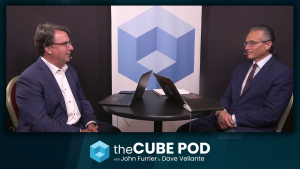You may not need Big Data after all | #MITIQ
![]() The business buzzword over the past two years has been “Big Data”. Companies are trying to figure our how they can leverage their collected data and translate it into a competitive advantage. However, according to the Director of MIT’s Sloan School Center for Information Systems Research, Jeanne Ross, this approach is not necessarily a one-size-fits-all for today’s organizations.
The business buzzword over the past two years has been “Big Data”. Companies are trying to figure our how they can leverage their collected data and translate it into a competitive advantage. However, according to the Director of MIT’s Sloan School Center for Information Systems Research, Jeanne Ross, this approach is not necessarily a one-size-fits-all for today’s organizations.
Ross, co-author of the article ‘You May Not Need Big Data After All’, cautions businesses against buying into the hype around Big Data.
“I think you grow into Big Data,” Ross notes. She explains that there are companies who find the competitive advantage works within their specific industries. As an example, she notes that the oil and gas industry has long employed Big Data for helping them to decide when and where they should place a billion dollar well. The success in one industry, however, doesn’t necessarily translate into success in others. “Many times we know great things about our customers. We just haven’t figured out a way to address them.”
When asked if the fear is misplaced that some companies feel in that they can’t address the Big Data they have, Ross states, “No, not misplaced at all. If you don’t think you can do it, you probably can’t.” For organizations recognizing the potential value of Big Data for the first time, this news could be disheartening.
Watch the interview in its entirety here:
“I don’t think most companies are data-driven,” explains Ross. “I think they are metric driven.”
This differentiation is important. Today’s companies can respond to certain kinds of data but in order to truly be a data-driven organization, they have to recognize which data is important. As an example, Ross cites Foxtel, a pay TV service based out of Australia.
“They saw what products were going out and what channels people wanted,” she states. Even with that information they were unable to make strategic decisions. “They went back and started looking at segments and realized what ‘data driven’ would be. They didn’t have the stomach to go back and do that.”
Where the CDO fits in
Discussing the emerging role of the CDO, Ross explained that too often there is a propensity to assume that once a CDO is brought into an organization all data issues will be addressed by that role and that little to no further attention is required. With Gartner projecting a 25 percent adoption of a CDO role in companies by next year, Ross claims most companies likely don’t need to create this position.
The key to running a successful organization is identifying and maintaining a single source of truth with respect to data. Many divisions within a company will manipulate data to show that they are running at a profit or contributing significantly to the organization’s bottom line. In the long run, this can be detrimental to the company because different data can show different outcomes.
Once companies adopt a single source of truth in their data, Ross believes it is of utmost importance that it is adopted in a top-down strategy. “We have to let people know mistakes have to be made. The faster you make mistakes, the more you can learn and the faster you can grow.” This strategy is ineffectual, however, if you start in the middle of the organization as people will be less willing to admit mistakes and failure if it hasn’t been adopted into the company’s cultural model.
The swiftly moving current of technology, especially over the previous five years, should be viewed critically by companies hoping to somehow gain a competitive advantage. Leveraging Big Data requires more than just a willingness to throw money at the problem. It requires a full understanding on the part of the company as a whole.
photo credit: Free Grunge Textures – www.freestock.ca via photopin cc
A message from John Furrier, co-founder of SiliconANGLE:
Your vote of support is important to us and it helps us keep the content FREE.
One click below supports our mission to provide free, deep, and relevant content.
Join our community on YouTube
Join the community that includes more than 15,000 #CubeAlumni experts, including Amazon.com CEO Andy Jassy, Dell Technologies founder and CEO Michael Dell, Intel CEO Pat Gelsinger, and many more luminaries and experts.
THANK YOU









